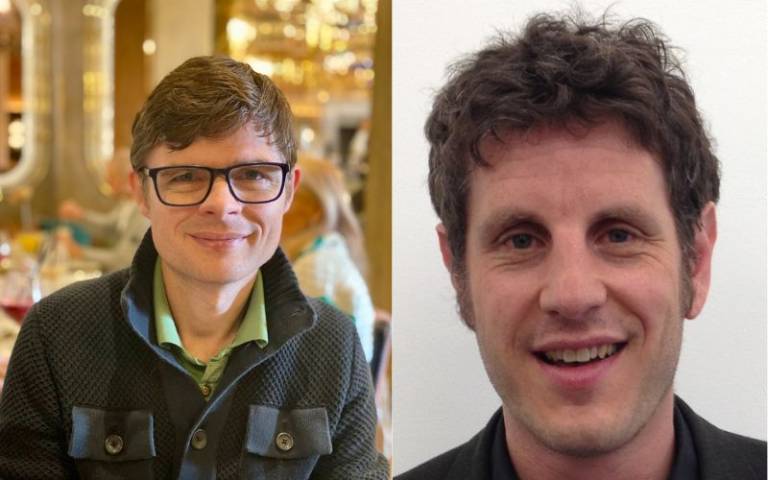UCL professors win European Research Council grants to explore cutting-edge research
30 March 2023
Two UCL academics have been awarded European Research Council (ERC) Advanced Grants worth approximately €2.4 million each to support their frontier research into the computation of neurons and AI medical imaging tests.

The grants will fund ground-breaking work in quantitative neuroscience, measuring different types of computations performed in the brain, and molecular biology, involving the integration of artificial intelligence with medical imaging tests such as MRIs.
Professor Kenneth Harris (UCL Queen Square Institute of Neurology) says he is fascinated by how billions of neurons in the brain automatically organise themselves together into networks that intelligently control behaviour, constantly learning and adapting to changing circumstances.
The ERC awarded Professor Harris a grant to support his research on the computation and biology of neuronal self-organisation. This involves quantitative analysis of large-scale neuronal recordings, and theoretical models of neuronal computation.
Professor Harris said: “The basic computing unit of the brain is the neuron. The cortex is made of many types of neurons, unlike the artificial neural networks used in AI which have essentially only one type. This grant will let us measure the different types of computation these neuron types perform in the living brain.”
Macromolecular motions and dynamics have intrigued Professor Flemming Hansen (UCL Biosciences) since the onset of his scientific career. Magnetic resonance techniques, such as NMR and MRI, are ubiquitous in many areas of science, from material sciences to clinical diagnosis. However, interpretations of the data and development of new methods are both tedious and hinge on experts with decades of training.
Supported by the ERC’s grant, Professor Hansen will be able to develop and integrate artificial intelligence with magnetic resonance. The autonomous analysis tools and intelligent machines created will provide scientists with unprecedented insights into a broad range of molecules and enzymes.
Professor Hansen said: “I am truly honoured to have been awarded this grant and I am excited to universalise magnetic resonance. Every scientist will soon be able to use magnetic resonance in their research programmes.”
The 2023 ERC Advanced Grants will see €544m (£477m) going to 218 leading researchers across Europe. The grants will provide researchers with the opportunity to pursue ambitious, curiosity-driven projects that could lead to major scientific breakthroughs.
In addition to strengthening Europe's knowledge base, the grants are expected to create more than 2,000 jobs for postdoctoral fellows, PhD students, and other staff at the host institutions.
Mariya Gabriel, the European Commissioner for Innovation, Research, Culture, Education and Youth, said: “ERC grants are a top recognition and a significant commitment from our best researchers. The €544 million funding puts our 218 research leaders, together with their teams of postdoctoral fellows, PhD students and research staff, in pole position to push back the boundaries of our knowledge, break new ground and build foundations for future growth and prosperity in Europe.”
Maria Leptin, European Research Council President, said: "These new ERC Advanced Grantees are a testament to the outstanding quality of research carried out across Europe. I am especially pleased to see such a high number of female researchers in this competition and that they are increasingly successful in securing funding.
“We look forward to seeing the results of the new projects in the years to come, with many likely to lead to breakthroughs and new advances.”
Links
- European Research Council (ERC)
- Professor Kenneth Harris’s academic profile
- Professor Flemming Hansen’s academic profile
- UCL Faculty of Life Sciences
- UCL Biosciences
- UCL Structural and Molecular Biology
- UCL Faculty of Brain Sciences
- UCL Queen Square Institute of Neurology
- UCL Neuromuscular Diseases
Media contact
Molly Bridge
E: molly.bridge [at] ucl.ac.uk
 Close
Close

